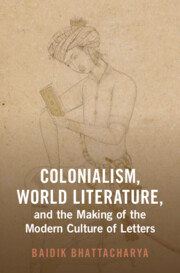Book contents
- Colonialism, World Literature, and the Making of the Modern Culture of Letters
- Cambridge Studies in World Literature
- Colonialism, World Literature, and the Making of the Modern Culture of Letters
- Copyright page
- Dedication
- Contents
- Figures
- Preface and Acknowledgments
- Introduction: Formations of the Literary Sovereign
- Part I Epistemic Habits
- Part II Aesthetic Conventions
- Chapter 4 Impure Aesthetics
- Chapter 5 Sanskrit on Shagreen
- Chapter 6 National Enframing
- Coda: Decolonization after World Literature
- Notes
- Bibliography
- Index
Chapter 6 - National Enframing
from Part II - Aesthetic Conventions
Published online by Cambridge University Press: 19 January 2024
- Colonialism, World Literature, and the Making of the Modern Culture of Letters
- Cambridge Studies in World Literature
- Colonialism, World Literature, and the Making of the Modern Culture of Letters
- Copyright page
- Dedication
- Contents
- Figures
- Preface and Acknowledgments
- Introduction: Formations of the Literary Sovereign
- Part I Epistemic Habits
- Part II Aesthetic Conventions
- Chapter 4 Impure Aesthetics
- Chapter 5 Sanskrit on Shagreen
- Chapter 6 National Enframing
- Coda: Decolonization after World Literature
- Notes
- Bibliography
- Index
Summary
Chapter 6 explores the gradual development of English literary history to trace how the autonomous and performative being of the literary came to be enframed within the nation, and how literary texts were seen as unmistakable expressions of national spirit. Some of these ideas were first expressed as part of the literary sovereign paradigm, and were reinforced through the successive stages of its travel across geographies. After the initial impetus from the colonial administrators, the idea of the literary and the nation as conjoined entities in history received a further elaboration in two publications from 1808 – Friedrich Schlegel’s On the Language and Wisdom of the Indians and Johann Gottlieb Fichte’s Addresses to the German Nation. Both Schlegel and Fichte identified unbroken literary tradition as the most organic expression of a nation, and both advocated for a “literature” in vernaculars as the most legitimate ground for a national history. However, the bulk of this chapter traces the new discipline of literary history in England, from Thomas Warton’s The History of English Poetry (1774–81) to Matthew Arnold’s On the Study of Celtic Literature (1867) and beyond.
- Type
- Chapter
- Information
- Publisher: Cambridge University PressPrint publication year: 2024

